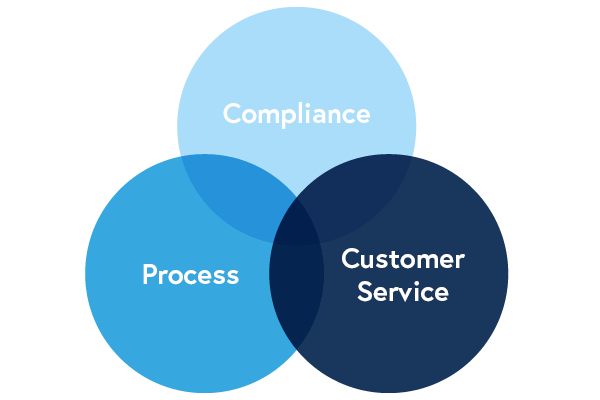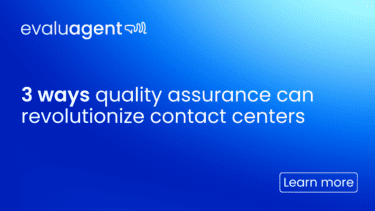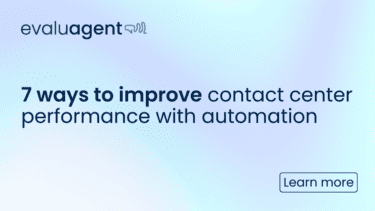According to Microsoft’s Global State of Multichannel Customer Service Report 2017, an eye-watering 97% of consumers say that customer service quality is crucial to retaining their loyalty.
You can be instrumental in helping to improve the overall customer experience (CX) by readdressing your call center quality assurance process.
When executed correctly, consistent quality assurance processes have the power to:
- Enhance a customer service agent’s performance
- Increase operational efficiency
- Most importantly, elevate that all-important CX
This guide has been created to ensure your call center quality assurance program is following best practice, and will equip you with everything you need by covering:
- The essential metrics and KPIs your quality assurance process must measure.
- How to produce evaluation forms that deliver.
- The latest quality monitoring trends.
- Quality assurance best practices.
- Creating quality reports that hit the mark.
- Three quick wins you can implement today.
By the time you have read this guide, you will have at your fingertips all the information you need to create a quality monitoring process that drives continual improvement in customer experience and your call center.
The essential metrics and KPIs your quality assurance process must measure
For decades, organisations have simply used metrics and KPIs to gauge efficiency; such as the number of calls answered, length of call and resolution rates.
But with organisations now focussing far more on CX, it follows that you have to take a more customer-centric view of the role of metrics and KPIs.
The leading organisations are now looking at ways in which their key indicators can measure the overall performance of their agents; gathering actionable insight that can improve agent performance, while listening carefully to the Voice of the Customer.
What metrics and KPIs should you use to measure quality?
Ask any call center professional what are the most important metrics and KPIs when measuring quality, and the chances are you will be presented with the following:
- Quality Scores
- Customer Satisfaction (CSAT)
- First Call Resolution (FCR)
- Net Promoter Score (NPS)
But before you accept this as the definitive list, stop and ask yourself: Is it right for my organisation?
For example, one metric that is all too often ignored is Agent Satisfaction (ASAT). It’s a metric that goes above and beyond measuring the performance of agents simply because they have followed the correct procedure. Through the use of surveys you can get the true measure of an agent’s abilities – as seen through the eyes of the customer.
And there are others worth considering, such as: Service Level, Speed of Answer and Average Handling Time (AHT). But whatever you choose, use them wisely!
For example, AHT may well provide you with an overview of productivity, but trying to get the call over in the shortest possible time does little to enhance CX or brand loyalty.
So to determine what metrics and KPIs you should employ, you need to define exactly what it is that you want to achieve from your quality assurance process.
What is your focus?
The starting point in defining a quality assurance programme is to identify what the key focus is for your organisation, is it sales, service or support?
What are your objectives?
The next step is to determine exactly what the objectives of your organisation or brand are, and how your quality assurance programme can best meet those goals.
Ask yourself the following questions:
- Are we serving our customers to the best of our ability? (Customer Satisfaction or CSAT)
- How well is our call center performing? (Operational Efficiency)
- Are we getting the best out of our agents? (Employee Engagement)
- Are we fully supporting business sales and service? (Organisational Value)
A healthy balance of metrics and KPIs will ensure that your organisation keeps customer satisfaction and loyalty high, while enabling your call center to operate efficiently and perform at the highest level. The metrics and KPIs that you include in your quality assurance programme, should reflect your answers.
Don’t try to measure everything
We live in an information-intensive world. By including every metric and KPI under the sun, all it achieves is to make it increasingly difficult to cut to the heart of what really matters.
Continue reading to see how we take this knowledge and feed it into your template evaluation forms…
How to produce evaluation forms that deliver
Armed with your definitive list of metrics and KPIs, the next step is to create evaluation forms that will drive your quality assurance programme on the ground.
When it comes to evaluation forms (aka scorecards) the bottom line is that you get out what you put in, or to be more brutal: garbage in = garbage out. Which is why you must identify and include the key line items that deliver the answers you’re looking for.
What to measure?
Broadly speaking, you’ll need to cover:
- Compliance
- Process
- Customer experience

The secret here is to get the balance right, in line with the objectives of your organisation.
All too often, call centers make the following three mistakes:
1) Too much information
Don’t overload your evaluation forms with repetitive or unnecessary line items. This can lead to over-complicating the evaluation process, confusing agents and longer AHT.
2) Too much emphasis on weighting
The weighting of line items is supposed to identify the most important elements of each evaluation form. But all too often they result in a situation where agents fail a quality evaluation, due to not meeting criteria which has little effect on the overall customer experience.
3) Scoring in black and white
Many evaluation forms are created using a simple Yes/No format. Few things in life are black and white, and your line items should reflect a more flexible and positive approach.
Thankfully, change is in the air…
These days, the most successful evaluation forms allow us to paint a broader picture of agent/customer interactions. By using a wider variety of scoring options such as ‘WOW’, ‘Meet’, ‘Coach’ and ‘OMG’ it opens up far greater possibilities for agent recognition and improvement.
Continuous improvement
No matter what line items you score and how you score them, remember that one of the key roles of the evaluation form is to deliver feedback to agents that leads to continuous improvement and will improve customer satisfaction.
See the whole picture
These days, an effective quality assurance programme must cover all relevant channels whether they be: email, social media, live chat or surveys.
As multichannel interactions become more commonplace, you need to take into account the changing nature of your customer interactions. There is no ‘one-size-fits-all’ evaluation form. Different channels require different methods of measurement, so the forms need to be designed to fit the channel and not the other way round.
Consultation and calibration
Before you put your evaluation forms to work, first you need to ensure that all relevant parties have a say in whether they are fit for purpose. That includes your agents who are all too often overlooked, even though they are on the front line and are key to ensuring a successful outcome.
In addition, the people entrusted with evaluating agent performance must also be in agreement as to what constitutes a good, bad or indifferent interaction. So hold regular calibration sessions and get talking about it!
Review, update and communicate
Over time, the goals of your quality assurance programme will evolve and change, so your evaluation forms must evolve along with them. By continuously monitoring and periodically updating line items to reflect the latest requirements, it will ensure the information and feedback you gather is always relevant and worthwhile. This is why you should invest in the latest quality assurance software in order to gather valuable feedback directly from your customers.
And don’t be afraid to move the goalposts along the way. Standards and requirements need to evolve continually in order to make sure you are always on top, and you always get the very best out of your agents.
Lastly, but by no means least, don’t forget to share and explain changes along the way, to ensure everyone is in the loop and fully engaged with the programme.
The latest quality monitoring trends
The call center sector is changing and evolving by the day, so you must stay up-to-date with the latest trends in order to remain competitive.
Here we examine the trends that are currently having the biggest effect on quality assurance.
Spreadsheets are history
Far too many call centers are still relying on outdated and time-consuming Excel spreadsheets leading to inadequate reporting and delayed feedback.
Yet the technology is now freely available that will instantly catapult your quality assurance programme into the 21st century. It comes in the form of a single intuitive platform that will enable you to score customer service interactions, quickly review and suggest improvements to agent performance, and produce detailed operational reports.
So tear up your spreadsheets and invest in the future with a quality monitoring platform.
The move from rigid line scoring to measuring the overall quality of the interaction
By concentrating too heavily on overly descriptive line items and rigid measurement, your quality framework fails both agents and customers. Forward-thinking organisations recognise that checklist-style approaches such as “Did you say the name 3 times” do not result in a good customer experience. As a result, they are now moving toward focusing on the overall outcome of customer satisfaction.
Flexibility is the key, and giving agents more autonomy over how they conduct themselves has been proven to increase personal motivation and overall CSAT.
Multichannel customer service requires multichannel evaluations
The shift in the way consumers access information, means that they regularly use at least four different channels. But what many call centers are failing to address is the need to evaluate each channel and the resulting interaction differently. There is no ‘one-size-fits-all’ in the multichannel call center!
Consumers are becoming more time conscious
For consumers across the world, the two most important factors that result in satisfaction are having their issue resolved quickly and preferably on first contact.
With the need to improve quality assurance in mind, it underlines the continuing need to focus on improving agent skills. So concentrate more on metrics such as FCR, and reduce your call center’s fixation with AHT.
Put your head in the cloud, but keep your feet firmly on the ground
To keep up with the increasing rate of change, you also need to adopt solutions that are integrated, scalable and modifiable. The new cloud services on offer will provide you with detailed analytics that enable almost real-time feedback, and the practical tools that your organisation needs if it is to emerge as a winner in the new multichannel revolution.
Quality assurance best practices
What do you have to do to create a flawless, five-star, gold-plated call center quality assurance process? The answer is quite simple – follow best practice.
In this section we will detail best practice by covering the following key points:
- Appoint a dedicated quality assurance professional.
- Involve all stakeholders in the creation of your quality assurance programme.
- Make sure your evaluators are singing off the same song sheet.
- Turn data into positive actionable insight.
- Save all gold standard interactions.
- Use surveys to complement your quality assurance programme.
- Follow the experts.
By following tried and tested quality assurance methods and procedures, you can take full advantage of the collective knowledge of the world’s leading call center professionals.
Appoint a dedicated quality assurance professional
If quality assurance is viewed as just yet another process, it should come as no surprise if it fails to be taken seriously.
With a quality assurance professional or team on board, not only will this undoubtedly improve your programme, it will send a clear signal to everyone about the importance of the quality process.
Involve all stakeholders in the creation of your quality assurance programme
If you simply present your colleagues with a predetermined set of rules and procedures, don’t be surprised if they view them with reluctance, not to mention a degree of suspicion. Involve them in the process of designing your quality assurance programme, and it will make them ambassadors for the cause.
Make sure your evaluators are singing off the same song sheet
Even the most meticulously selected line items are subject to individual interpretation, which can result in agents believing they aren’t being treated fairly. By organising regular calibration sessions it can iron out differences and produce more consistent scoring.
Turn data into positive, actionable insight
While a comprehensive quality assurance process delivers invaluable insight, all too often it is used solely to highlight agent errors. So instead of using evaluation sessions to highlight an agent’s failings, start by praising their achievements (however small), encourage positive behaviours, and coach those areas that require improvement.
Equally, when data is collected and is in a form that can be shared across the call center, it can serve as the foundation for a wide and varied set of improvements. You can use it to set standards for future line items, improve reporting procedures and recognise far-reaching opportunities for call center coaching training. In short, quality management not only serves to improve the customer experience, it can help improve processes across your entire organisation.
Save all gold-standard interactions
When customer interactions meet the very highest standards save them! This way you can highlight successful techniques and make a note of the words, language and interactions that resulted in a satisfied customer.
These can then be used to demonstrate best practices to new recruits, improve agent skills or simply motivate everyone to be better.
Use surveys to complement your quality assurance programme
Capturing the true Voice of the Customer by employing surveys at the point of the customer experience is another invaluable way to improve your quality monitoring.
By capturing, interpreting and acting on feedback in real-time, not only will it provide you and your agents with an immediate source of information, it is also proven to increase CSAT.
Follow the experts
There is a wealth of expertise on the subject of quality assurance freely available for anyone looking for help and advice, simply by getting involved with the wider call center community.
Read the blogs or follow the LinkedIn or Twitter posts of customer service experts like Shep Hyken, or sign up to evaluagent’s own LinkedIn newsletter for top tips.
By engaging with people and organisations outside of your organisation, it will provide you with a broader picture of changing trends, and leave you perfectly positioned to incorporate the very latest ideas into your own quality assurance process.
Creating quality reports that hit the mark
It’s impossible to overestimate the importance of reporting. Without accurate, timely and effective reporting, all your hard work in identifying the key metrics and KPIs, creating line items and producing evaluation forms, is quite simply wasted. In addition, how can you prove the value of quality monitoring if no one sees all your hard work?
So here’s what you need to do:
Step 1: Determine who will see the reports
In the past, only senior management was given access to quality assurance reports. Much of the reason for this, was the inability to produce reports that were understandable to anyone but the most experienced and knowledgeable members of the call center.
In the last decade, we have seen the introduction of dedicated team members covering roles such as quality auditing, coaching and operational management. As a result, there is now a growing need to define exactly who needs to see the reports and what they want to see, for example:
- Agents want to see how they are performing over time and against a benchmark of their peers.
- Team leaders require a broader overview of the agents under their charge together with the ability to drill down to the level of an individual agent.
- Operational managers and quality specialists need to see the overall performance of the call center across different sites, departments and teams.
Step 2: Define your reporting requirements
For quality assurance there are broadly three main reports that you need to identify opportunities for improvement, trends and in support of overall performance management.
- Operational performance reports
Provide you with the ability to identify key performance indicators such as, where underperformance is occurring, whichteams are impacting the score, and ultimately which agents are most in need of feedback and coaching.
- Line item reports
Enable you to analyse performance by individual line item, so that you can focus on very specific aspects of all customer interactions such as, how many evaluations have been completed for a particular reporting period; how many times a line item was applicable; and provide you with a breakdown of how agents performed on a specific task.
- Evaluator performance reports
When operational targets have been set, this report allows you to see how you are performing within those targets across a chosen period of time.
Step 3: Present the information in the best possible light
If your quality assurance process still requires you to produce reports using Excel spreadsheets, it’s time you invested in the new technologies.
Aside from being labour intensive, the problem with spreadsheets is that they simply can’t deliver detailed operational reports that everyone can understand and act on.
Employing a web-based application will immediately elevate your quality assurance process to a whole new level. When making your decision, any application worth investing in should empower you with the following features:
- It operates in the cloud (for cost-effectiveness and scalability)
- Offers a simple to use interface (a.k.a. a dashboard capable of being used by all stakeholders right across the call center)
- Provides intelligent and secure multi-level user access (enabling you to create detailed reports at management level, and drill all the way down to the individual agent level – at the click of a button)
Three quick wins you can implement today
Introducing a comprehensive cycle of data collection, analysis, training and improvement undoubtedly delivers exceptional quality assurance.
But if the prospect of completely overhauling your existing programme is a little daunting, below are three practical tips that will show immediate results:
- Make sure your metrics and KPIs really do help the quality assurance process. (For example, while AHT is a commonly used metric, it’s actually detrimental to the quality process if agents are focussing on the length of the call rather than the satisfaction of the customer).
- Measure the overall quality of every customer interaction. (Line items are only there for guidance not as a rigid box-ticking exercise. The real value lies in viewing the interaction through the eyes of the customer, if they are happy with the outcome, so should you).
- Ensure any insight you gain is used to highlight the positive and not just the negative. (You only have to ask agents how they feel about evaluation sessions to discover how all too often they are used purely to focus on their failings. Just a little praise goes a long, long way).



